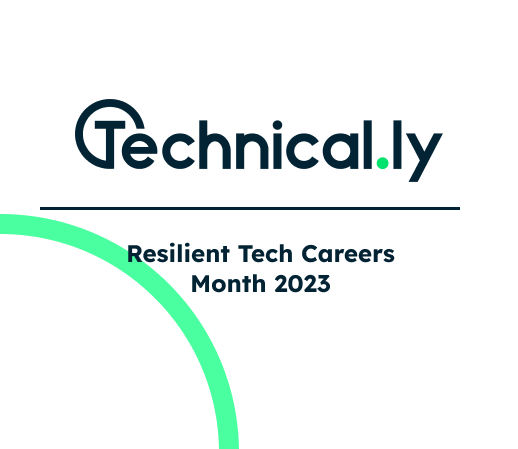These days, it’s as if you could twirl around at a recruitment fair, stop, point your finger and easily spot a company offering tech jobs — and they wouldn’t all be tech companies.
But please don’t just spin around aimlessly at job fairs (or anywhere for that matter). You can instead check out Technical.ly’s How to Get a Tech Job Month content or sign up for our newsletter and GIF-loving content series This Week in Jobs.
Given the current economic challenges (for which women especially bear the brunt), layoffs in sectors like biotech and a seeming recession that isn’t over for everyone, the process of jobseeking is not always straightforward. It can be challenging to identify companies that are actively hiring for specific roles or navigate a career pivot.
While tech jobs are plentiful (at least in our newsletter), your skills must be aligned with what companies might need. To assist aspiring technologists in their quest for the most resilient tech careers, we reached out to Anna McKinnies, director of technology recruitment at T. Rowe Price. Below, you’ll find some of her advice, condensed for brevity and clarity.
Aspiring technologists might be eager to learn about common pitfalls that job seekers might encounter, especially those new to the field and unaware of crucial aspects in their job search. Could you share advice and strategies for individuals interested in transitioning into technology roles within non-tech organizations?
Absolutely. I think a few things that we see that hold people back is, one, is there’s this, the fear of the technical interview and what that is that really. I would [suggest] thinking about that more as: This is an opportunity to speak with other technologists about how you may approach a project. There isn’t this expectation that you’re an expert at everything, but how you made the decisions you’ve made, how do you, in the moment, take feedback or suggestions or collaborate? It’s really about the how as much as the one in that interview, and kind of pivoting from being intimidated by that.
Could you provide insights on tech roles at a non-tech company that have demonstrated resilience?
Yeah, absolutely. So I think with, as with many firms, we are consistently looking for software engineers, but also roles like architects and data scientists. And since technology enables so much of the business, you’ll also see technical project management, technical business analysts, product owners, as well as positions in enterprise security and on the infrastructure side.
Additionally, what specific skills or certifications are typically sought after for these roles?
Yeah, that’s a great question. I think across industries — I mean, the skills that are so desired again, I think, talking about the cloud platforms, there’s plenty of certifications, you know. Many here have the AWS certification, a lot of firms [have] the microservice architecture, there’s a lot of work around modern user interface development. As I mentioned, the agile methodology, there is a big trend towards data — and not just kind of data science and AI, but how do you take all of this data that’s sitting in, in our database and what do we do with that and make it more usable?
Given your role and expertise as a director of technology recruitment, can you provide advice for professionals looking to build resilient tech careers, especially in the financial sector?
Yeah, I love this question because I think it’s not just being, like, the strongest technologists or the best coder. But really understanding the firm that you work for values beyond those skills and then making sure you’re setting your own development, your professional goals accordingly.

This editorial article is a part of Resilient Tech Careers Month of Technical.ly’s editorial calendar.
Before you go...
To keep our site paywall-free, we’re launching a campaign to raise $25,000 by the end of the year. We believe information about entrepreneurs and tech should be accessible to everyone and your support helps make that happen, because journalism costs money.
Can we count on you? Your contribution to the Technical.ly Journalism Fund is tax-deductible.
Join our growing Slack community
Join 5,000 tech professionals and entrepreneurs in our community Slack today!

The person charged in the UnitedHealthcare CEO shooting had a ton of tech connections

The looming TikTok ban doesn’t strike financial fear into the hearts of creators — it’s community they’re worried about

Where are the country’s most vibrant tech and startup communities?



